Analyzing Compensation and Benefits in HRM within Iceland Retail
VerifiedAdded on 2023/06/13
|22
|5874
|148
Report
AI Summary
This research report investigates the significance of compensation and benefits within human resource management (HRM) in the retail industry, focusing on Iceland Foods Ltd. It aims to identify the importance of compensation and benefits on employee retention. The research objectives include determining the importance of compensation and benefits for employees, discerning the types of compensation and benefits offered by Iceland, examining the impact of these on employee retention and business performance, and identifying challenges faced by Iceland in selecting benefits and compensation. The methodology employs a qualitative approach using questionnaires for primary data collection, supplemented by secondary research and statistical analysis. The report delves into themes such as the importance of compensation in attracting and retaining talent, the types of benefits offered by Iceland (including wages, restaurant access, gym memberships, and pension schemes), the impact of compensation on employee retention and organizational productivity, and the challenges faced by Iceland in maintaining consistent and satisfactory compensation policies across its stores.
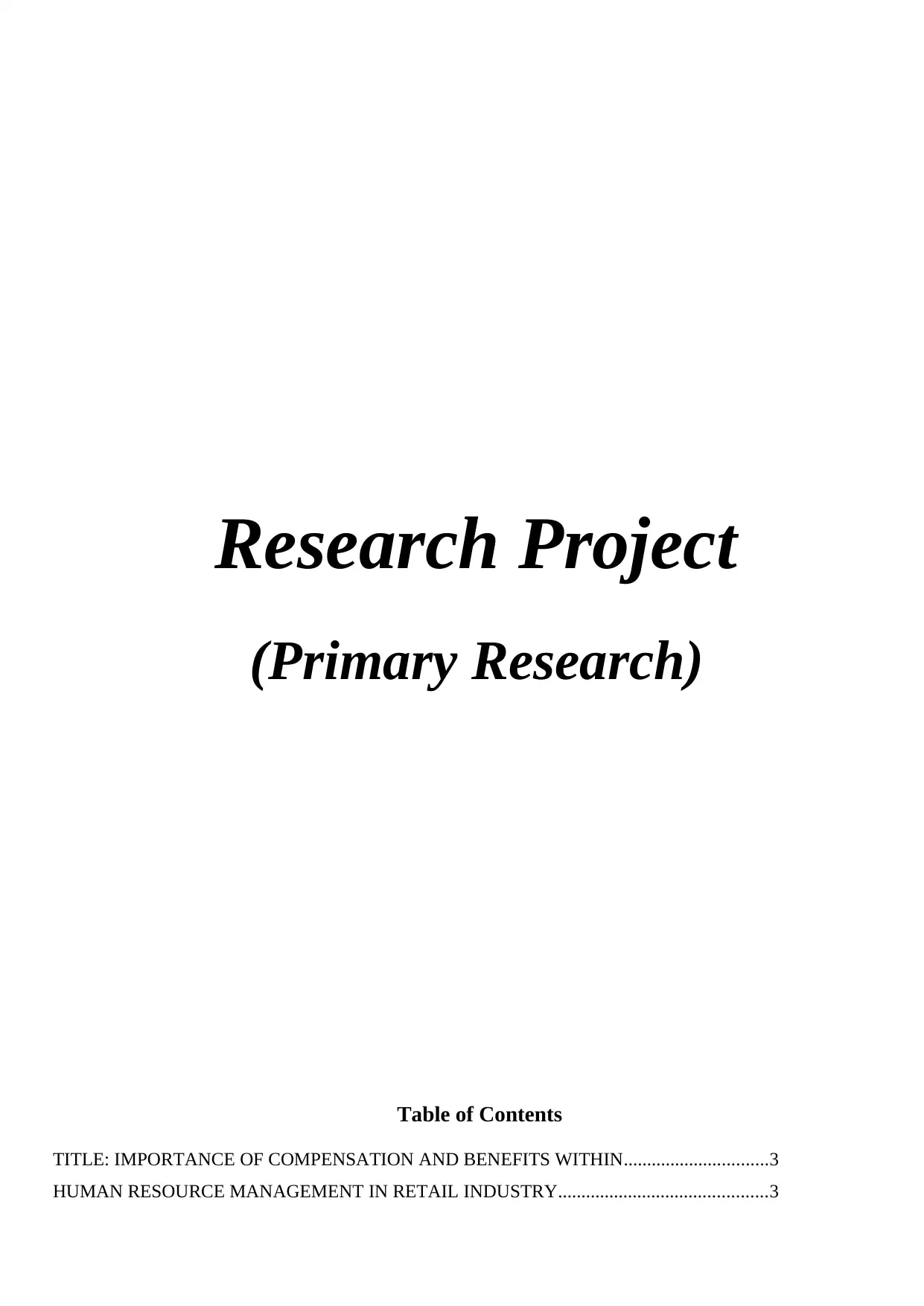
Research Project
(Primary Research)
Table of Contents
TITLE: IMPORTANCE OF COMPENSATION AND BENEFITS WITHIN...............................3
HUMAN RESOURCE MANAGEMENT IN RETAIL INDUSTRY.............................................3
(Primary Research)
Table of Contents
TITLE: IMPORTANCE OF COMPENSATION AND BENEFITS WITHIN...............................3
HUMAN RESOURCE MANAGEMENT IN RETAIL INDUSTRY.............................................3
Paraphrase This Document
Need a fresh take? Get an instant paraphrase of this document with our AI Paraphraser
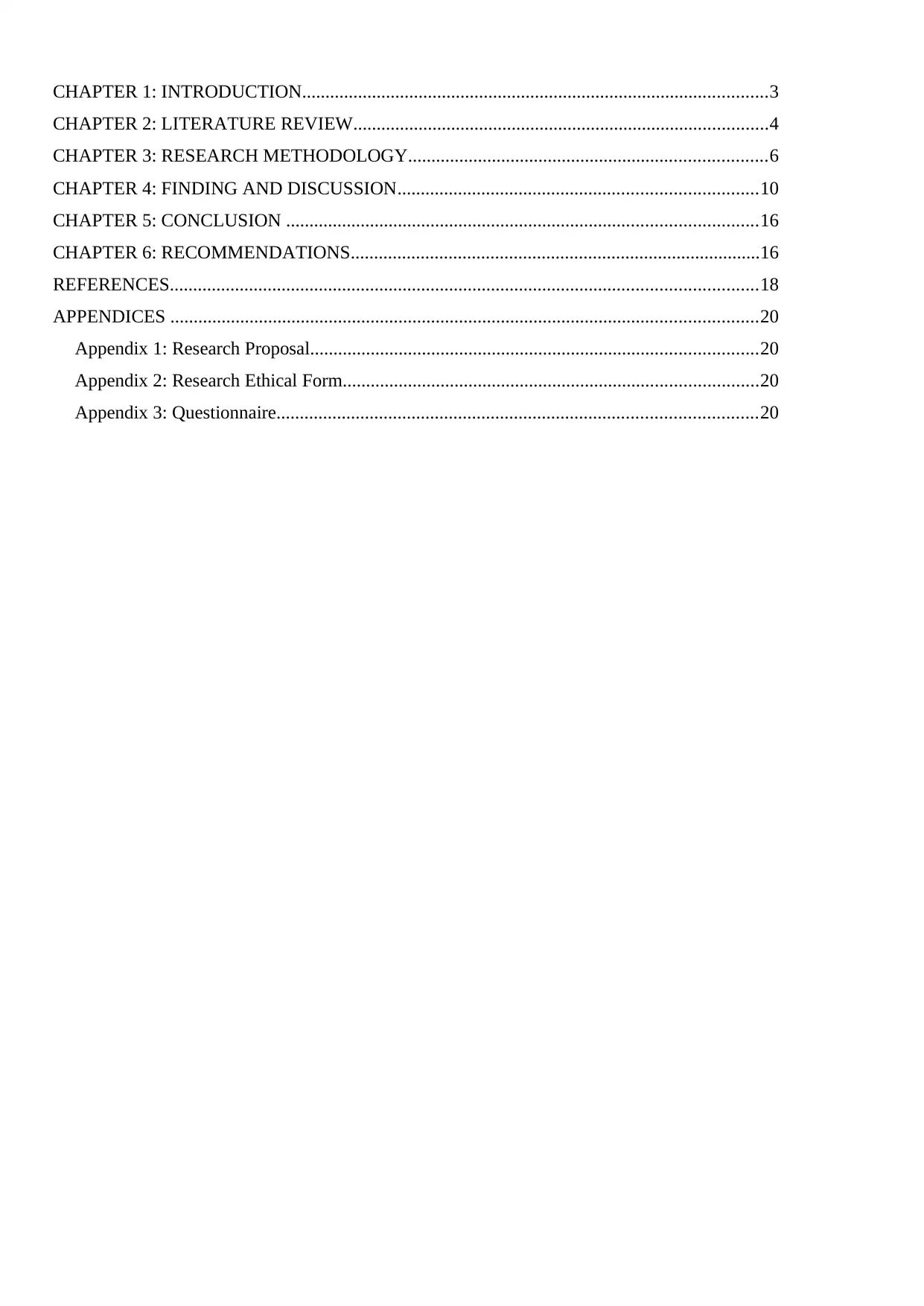
CHAPTER 1: INTRODUCTION....................................................................................................3
CHAPTER 2: LITERATURE REVIEW.........................................................................................4
CHAPTER 3: RESEARCH METHODOLOGY.............................................................................6
CHAPTER 4: FINDING AND DISCUSSION.............................................................................10
CHAPTER 5: CONCLUSION .....................................................................................................16
CHAPTER 6: RECOMMENDATIONS........................................................................................16
REFERENCES..............................................................................................................................18
APPENDICES ..............................................................................................................................20
Appendix 1: Research Proposal................................................................................................20
Appendix 2: Research Ethical Form.........................................................................................20
Appendix 3: Questionnaire.......................................................................................................20
CHAPTER 2: LITERATURE REVIEW.........................................................................................4
CHAPTER 3: RESEARCH METHODOLOGY.............................................................................6
CHAPTER 4: FINDING AND DISCUSSION.............................................................................10
CHAPTER 5: CONCLUSION .....................................................................................................16
CHAPTER 6: RECOMMENDATIONS........................................................................................16
REFERENCES..............................................................................................................................18
APPENDICES ..............................................................................................................................20
Appendix 1: Research Proposal................................................................................................20
Appendix 2: Research Ethical Form.........................................................................................20
Appendix 3: Questionnaire.......................................................................................................20
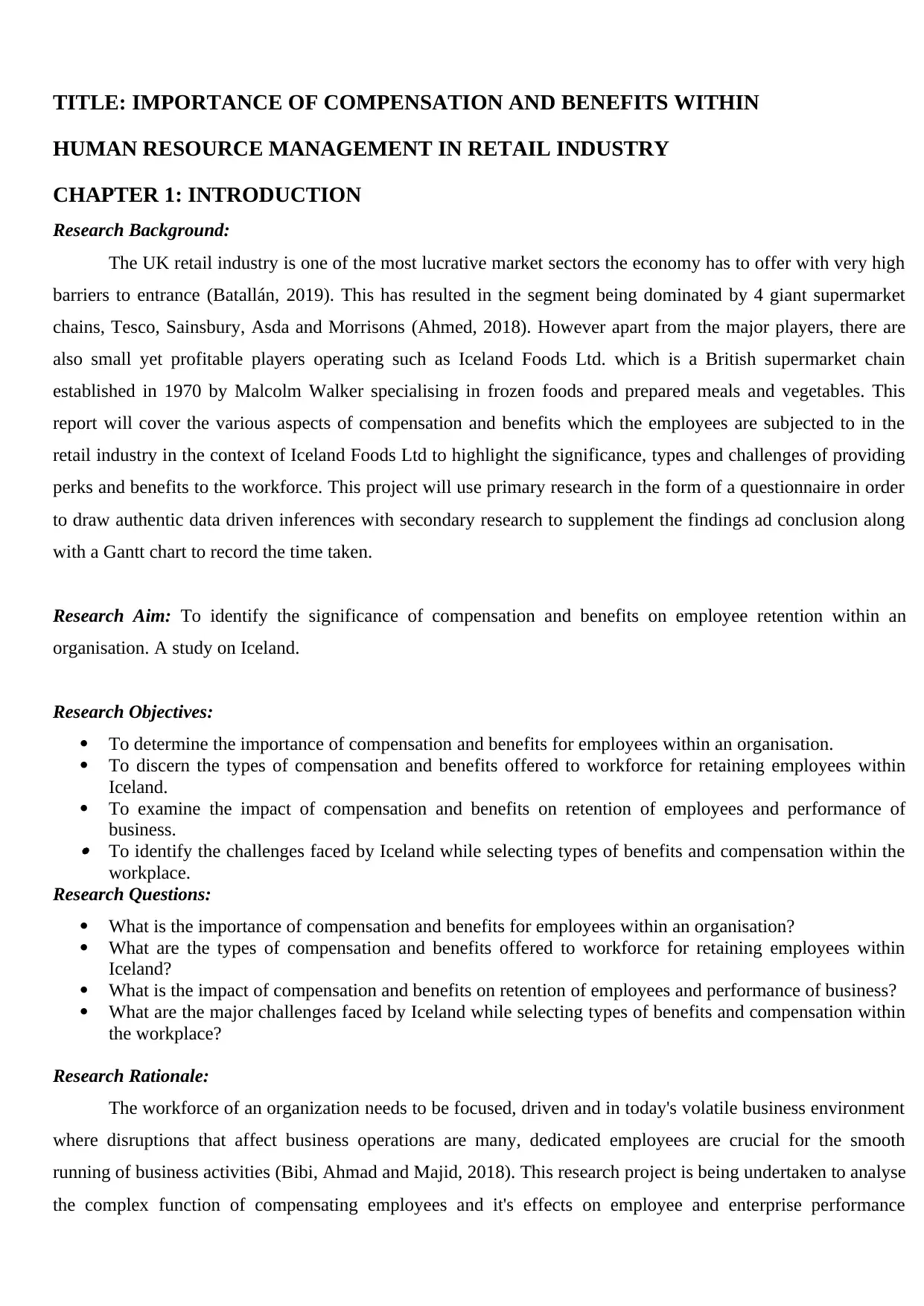
TITLE: IMPORTANCE OF COMPENSATION AND BENEFITS WITHIN
HUMAN RESOURCE MANAGEMENT IN RETAIL INDUSTRY
CHAPTER 1: INTRODUCTION
Research Background:
The UK retail industry is one of the most lucrative market sectors the economy has to offer with very high
barriers to entrance (Batallán, 2019). This has resulted in the segment being dominated by 4 giant supermarket
chains, Tesco, Sainsbury, Asda and Morrisons (Ahmed, 2018). However apart from the major players, there are
also small yet profitable players operating such as Iceland Foods Ltd. which is a British supermarket chain
established in 1970 by Malcolm Walker specialising in frozen foods and prepared meals and vegetables. This
report will cover the various aspects of compensation and benefits which the employees are subjected to in the
retail industry in the context of Iceland Foods Ltd to highlight the significance, types and challenges of providing
perks and benefits to the workforce. This project will use primary research in the form of a questionnaire in order
to draw authentic data driven inferences with secondary research to supplement the findings ad conclusion along
with a Gantt chart to record the time taken.
Research Aim: To identify the significance of compensation and benefits on employee retention within an
organisation. A study on Iceland.
Research Objectives:
To determine the importance of compensation and benefits for employees within an organisation.
To discern the types of compensation and benefits offered to workforce for retaining employees within
Iceland.
To examine the impact of compensation and benefits on retention of employees and performance of
business. To identify the challenges faced by Iceland while selecting types of benefits and compensation within the
workplace.
Research Questions:
What is the importance of compensation and benefits for employees within an organisation?
What are the types of compensation and benefits offered to workforce for retaining employees within
Iceland?
What is the impact of compensation and benefits on retention of employees and performance of business?
What are the major challenges faced by Iceland while selecting types of benefits and compensation within
the workplace?
Research Rationale:
The workforce of an organization needs to be focused, driven and in today's volatile business environment
where disruptions that affect business operations are many, dedicated employees are crucial for the smooth
running of business activities (Bibi, Ahmad and Majid, 2018). This research project is being undertaken to analyse
the complex function of compensating employees and it's effects on employee and enterprise performance
HUMAN RESOURCE MANAGEMENT IN RETAIL INDUSTRY
CHAPTER 1: INTRODUCTION
Research Background:
The UK retail industry is one of the most lucrative market sectors the economy has to offer with very high
barriers to entrance (Batallán, 2019). This has resulted in the segment being dominated by 4 giant supermarket
chains, Tesco, Sainsbury, Asda and Morrisons (Ahmed, 2018). However apart from the major players, there are
also small yet profitable players operating such as Iceland Foods Ltd. which is a British supermarket chain
established in 1970 by Malcolm Walker specialising in frozen foods and prepared meals and vegetables. This
report will cover the various aspects of compensation and benefits which the employees are subjected to in the
retail industry in the context of Iceland Foods Ltd to highlight the significance, types and challenges of providing
perks and benefits to the workforce. This project will use primary research in the form of a questionnaire in order
to draw authentic data driven inferences with secondary research to supplement the findings ad conclusion along
with a Gantt chart to record the time taken.
Research Aim: To identify the significance of compensation and benefits on employee retention within an
organisation. A study on Iceland.
Research Objectives:
To determine the importance of compensation and benefits for employees within an organisation.
To discern the types of compensation and benefits offered to workforce for retaining employees within
Iceland.
To examine the impact of compensation and benefits on retention of employees and performance of
business. To identify the challenges faced by Iceland while selecting types of benefits and compensation within the
workplace.
Research Questions:
What is the importance of compensation and benefits for employees within an organisation?
What are the types of compensation and benefits offered to workforce for retaining employees within
Iceland?
What is the impact of compensation and benefits on retention of employees and performance of business?
What are the major challenges faced by Iceland while selecting types of benefits and compensation within
the workplace?
Research Rationale:
The workforce of an organization needs to be focused, driven and in today's volatile business environment
where disruptions that affect business operations are many, dedicated employees are crucial for the smooth
running of business activities (Bibi, Ahmad and Majid, 2018). This research project is being undertaken to analyse
the complex function of compensating employees and it's effects on employee and enterprise performance
⊘ This is a preview!⊘
Do you want full access?
Subscribe today to unlock all pages.

Trusted by 1+ million students worldwide
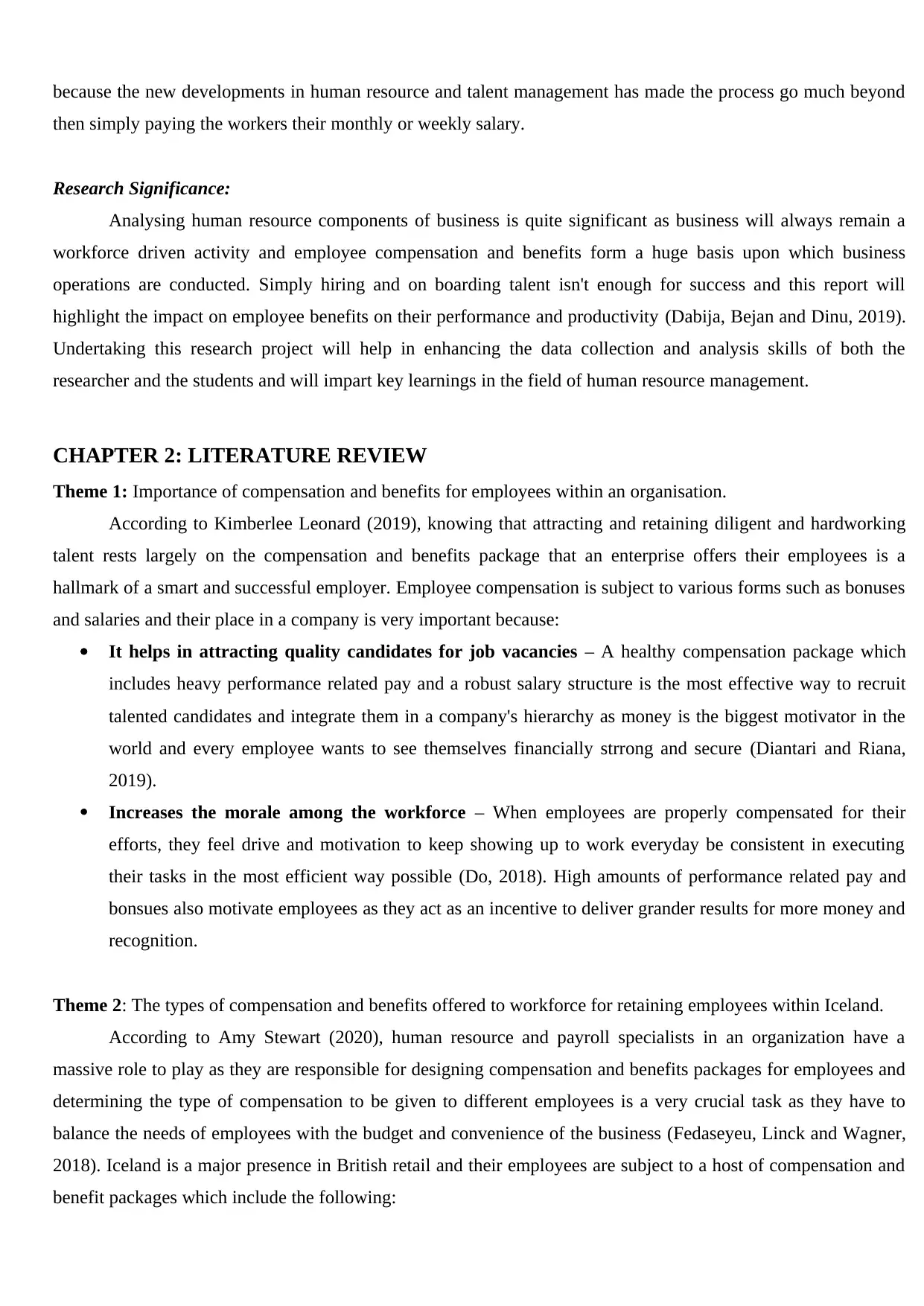
because the new developments in human resource and talent management has made the process go much beyond
then simply paying the workers their monthly or weekly salary.
Research Significance:
Analysing human resource components of business is quite significant as business will always remain a
workforce driven activity and employee compensation and benefits form a huge basis upon which business
operations are conducted. Simply hiring and on boarding talent isn't enough for success and this report will
highlight the impact on employee benefits on their performance and productivity (Dabija, Bejan and Dinu, 2019).
Undertaking this research project will help in enhancing the data collection and analysis skills of both the
researcher and the students and will impart key learnings in the field of human resource management.
CHAPTER 2: LITERATURE REVIEW
Theme 1: Importance of compensation and benefits for employees within an organisation.
According to Kimberlee Leonard (2019), knowing that attracting and retaining diligent and hardworking
talent rests largely on the compensation and benefits package that an enterprise offers their employees is a
hallmark of a smart and successful employer. Employee compensation is subject to various forms such as bonuses
and salaries and their place in a company is very important because:
It helps in attracting quality candidates for job vacancies – A healthy compensation package which
includes heavy performance related pay and a robust salary structure is the most effective way to recruit
talented candidates and integrate them in a company's hierarchy as money is the biggest motivator in the
world and every employee wants to see themselves financially strrong and secure (Diantari and Riana,
2019).
Increases the morale among the workforce – When employees are properly compensated for their
efforts, they feel drive and motivation to keep showing up to work everyday be consistent in executing
their tasks in the most efficient way possible (Do, 2018). High amounts of performance related pay and
bonsues also motivate employees as they act as an incentive to deliver grander results for more money and
recognition.
Theme 2: The types of compensation and benefits offered to workforce for retaining employees within Iceland.
According to Amy Stewart (2020), human resource and payroll specialists in an organization have a
massive role to play as they are responsible for designing compensation and benefits packages for employees and
determining the type of compensation to be given to different employees is a very crucial task as they have to
balance the needs of employees with the budget and convenience of the business (Fedaseyeu, Linck and Wagner,
2018). Iceland is a major presence in British retail and their employees are subject to a host of compensation and
benefit packages which include the following:
then simply paying the workers their monthly or weekly salary.
Research Significance:
Analysing human resource components of business is quite significant as business will always remain a
workforce driven activity and employee compensation and benefits form a huge basis upon which business
operations are conducted. Simply hiring and on boarding talent isn't enough for success and this report will
highlight the impact on employee benefits on their performance and productivity (Dabija, Bejan and Dinu, 2019).
Undertaking this research project will help in enhancing the data collection and analysis skills of both the
researcher and the students and will impart key learnings in the field of human resource management.
CHAPTER 2: LITERATURE REVIEW
Theme 1: Importance of compensation and benefits for employees within an organisation.
According to Kimberlee Leonard (2019), knowing that attracting and retaining diligent and hardworking
talent rests largely on the compensation and benefits package that an enterprise offers their employees is a
hallmark of a smart and successful employer. Employee compensation is subject to various forms such as bonuses
and salaries and their place in a company is very important because:
It helps in attracting quality candidates for job vacancies – A healthy compensation package which
includes heavy performance related pay and a robust salary structure is the most effective way to recruit
talented candidates and integrate them in a company's hierarchy as money is the biggest motivator in the
world and every employee wants to see themselves financially strrong and secure (Diantari and Riana,
2019).
Increases the morale among the workforce – When employees are properly compensated for their
efforts, they feel drive and motivation to keep showing up to work everyday be consistent in executing
their tasks in the most efficient way possible (Do, 2018). High amounts of performance related pay and
bonsues also motivate employees as they act as an incentive to deliver grander results for more money and
recognition.
Theme 2: The types of compensation and benefits offered to workforce for retaining employees within Iceland.
According to Amy Stewart (2020), human resource and payroll specialists in an organization have a
massive role to play as they are responsible for designing compensation and benefits packages for employees and
determining the type of compensation to be given to different employees is a very crucial task as they have to
balance the needs of employees with the budget and convenience of the business (Fedaseyeu, Linck and Wagner,
2018). Iceland is a major presence in British retail and their employees are subject to a host of compensation and
benefit packages which include the following:
Paraphrase This Document
Need a fresh take? Get an instant paraphrase of this document with our AI Paraphraser
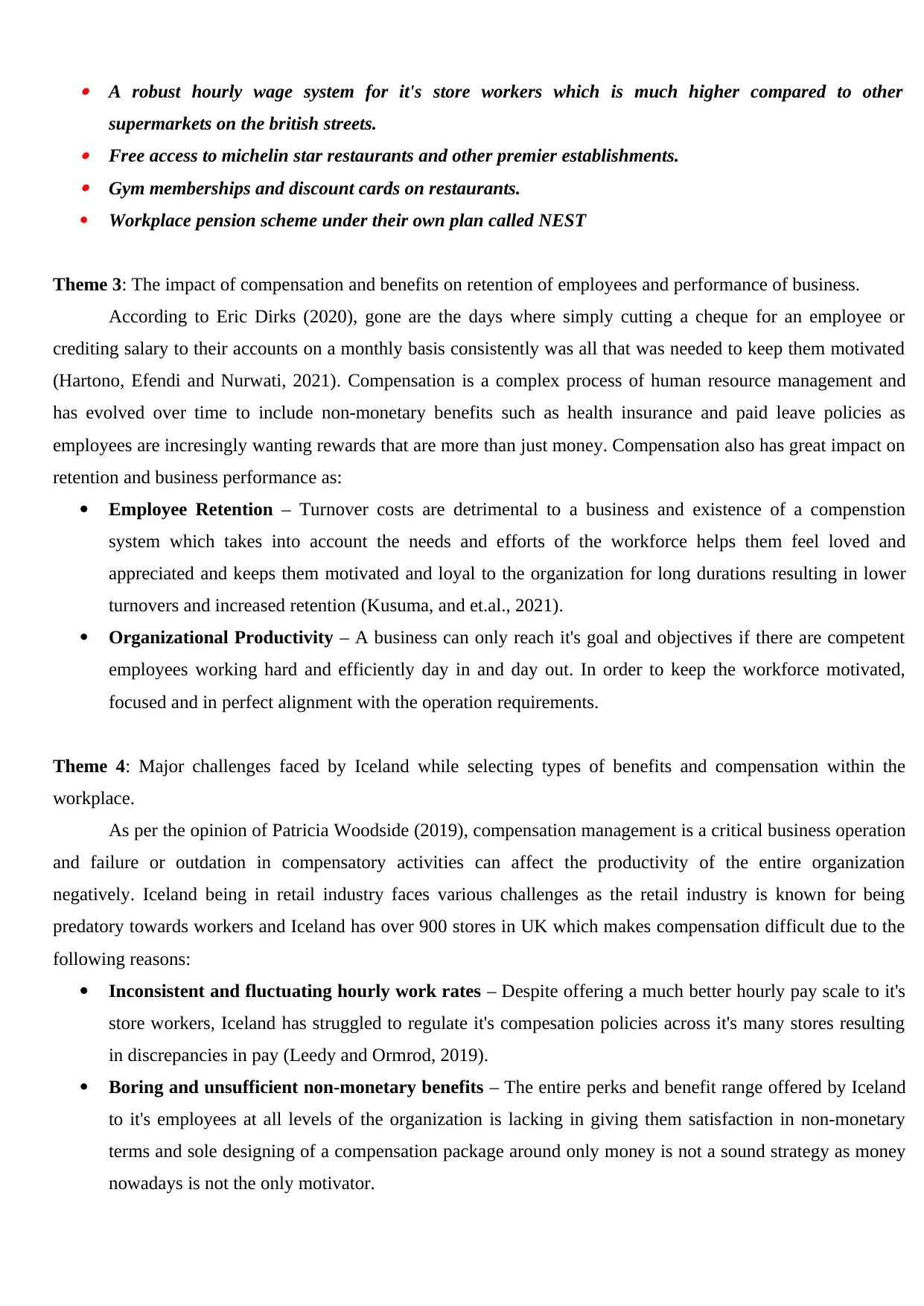
A robust hourly wage system for it's store workers which is much higher compared to other
supermarkets on the british streets.
Free access to michelin star restaurants and other premier establishments.
Gym memberships and discount cards on restaurants.
Workplace pension scheme under their own plan called NEST
Theme 3: The impact of compensation and benefits on retention of employees and performance of business.
According to Eric Dirks (2020), gone are the days where simply cutting a cheque for an employee or
crediting salary to their accounts on a monthly basis consistently was all that was needed to keep them motivated
(Hartono, Efendi and Nurwati, 2021). Compensation is a complex process of human resource management and
has evolved over time to include non-monetary benefits such as health insurance and paid leave policies as
employees are incresingly wanting rewards that are more than just money. Compensation also has great impact on
retention and business performance as:
Employee Retention – Turnover costs are detrimental to a business and existence of a compenstion
system which takes into account the needs and efforts of the workforce helps them feel loved and
appreciated and keeps them motivated and loyal to the organization for long durations resulting in lower
turnovers and increased retention (Kusuma, and et.al., 2021).
Organizational Productivity – A business can only reach it's goal and objectives if there are competent
employees working hard and efficiently day in and day out. In order to keep the workforce motivated,
focused and in perfect alignment with the operation requirements.
Theme 4: Major challenges faced by Iceland while selecting types of benefits and compensation within the
workplace.
As per the opinion of Patricia Woodside (2019), compensation management is a critical business operation
and failure or outdation in compensatory activities can affect the productivity of the entire organization
negatively. Iceland being in retail industry faces various challenges as the retail industry is known for being
predatory towards workers and Iceland has over 900 stores in UK which makes compensation difficult due to the
following reasons:
Inconsistent and fluctuating hourly work rates – Despite offering a much better hourly pay scale to it's
store workers, Iceland has struggled to regulate it's compesation policies across it's many stores resulting
in discrepancies in pay (Leedy and Ormrod, 2019).
Boring and unsufficient non-monetary benefits – The entire perks and benefit range offered by Iceland
to it's employees at all levels of the organization is lacking in giving them satisfaction in non-monetary
terms and sole designing of a compensation package around only money is not a sound strategy as money
nowadays is not the only motivator.
supermarkets on the british streets.
Free access to michelin star restaurants and other premier establishments.
Gym memberships and discount cards on restaurants.
Workplace pension scheme under their own plan called NEST
Theme 3: The impact of compensation and benefits on retention of employees and performance of business.
According to Eric Dirks (2020), gone are the days where simply cutting a cheque for an employee or
crediting salary to their accounts on a monthly basis consistently was all that was needed to keep them motivated
(Hartono, Efendi and Nurwati, 2021). Compensation is a complex process of human resource management and
has evolved over time to include non-monetary benefits such as health insurance and paid leave policies as
employees are incresingly wanting rewards that are more than just money. Compensation also has great impact on
retention and business performance as:
Employee Retention – Turnover costs are detrimental to a business and existence of a compenstion
system which takes into account the needs and efforts of the workforce helps them feel loved and
appreciated and keeps them motivated and loyal to the organization for long durations resulting in lower
turnovers and increased retention (Kusuma, and et.al., 2021).
Organizational Productivity – A business can only reach it's goal and objectives if there are competent
employees working hard and efficiently day in and day out. In order to keep the workforce motivated,
focused and in perfect alignment with the operation requirements.
Theme 4: Major challenges faced by Iceland while selecting types of benefits and compensation within the
workplace.
As per the opinion of Patricia Woodside (2019), compensation management is a critical business operation
and failure or outdation in compensatory activities can affect the productivity of the entire organization
negatively. Iceland being in retail industry faces various challenges as the retail industry is known for being
predatory towards workers and Iceland has over 900 stores in UK which makes compensation difficult due to the
following reasons:
Inconsistent and fluctuating hourly work rates – Despite offering a much better hourly pay scale to it's
store workers, Iceland has struggled to regulate it's compesation policies across it's many stores resulting
in discrepancies in pay (Leedy and Ormrod, 2019).
Boring and unsufficient non-monetary benefits – The entire perks and benefit range offered by Iceland
to it's employees at all levels of the organization is lacking in giving them satisfaction in non-monetary
terms and sole designing of a compensation package around only money is not a sound strategy as money
nowadays is not the only motivator.
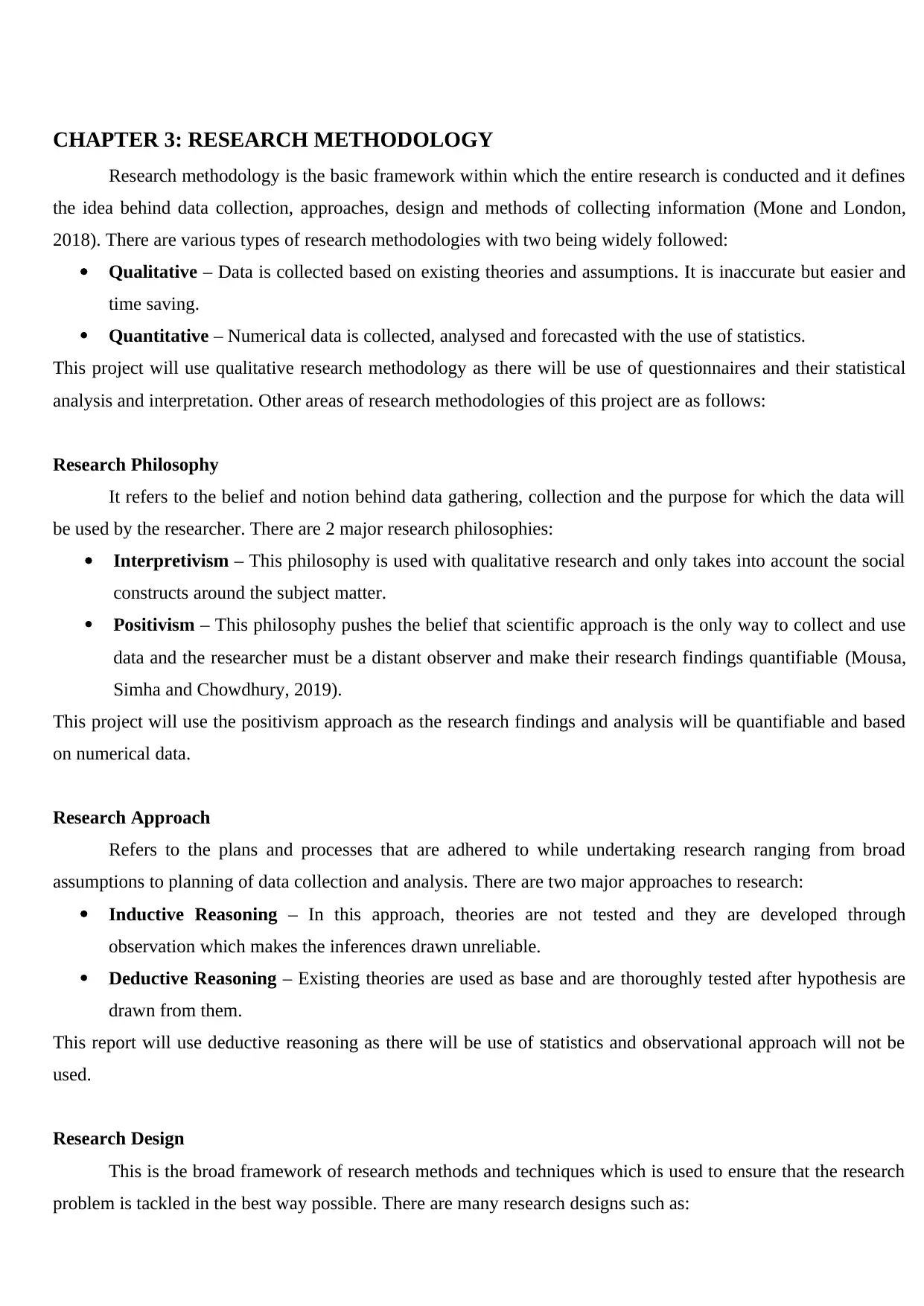
CHAPTER 3: RESEARCH METHODOLOGY
Research methodology is the basic framework within which the entire research is conducted and it defines
the idea behind data collection, approaches, design and methods of collecting information (Mone and London,
2018). There are various types of research methodologies with two being widely followed:
Qualitative – Data is collected based on existing theories and assumptions. It is inaccurate but easier and
time saving.
Quantitative – Numerical data is collected, analysed and forecasted with the use of statistics.
This project will use qualitative research methodology as there will be use of questionnaires and their statistical
analysis and interpretation. Other areas of research methodologies of this project are as follows:
Research Philosophy
It refers to the belief and notion behind data gathering, collection and the purpose for which the data will
be used by the researcher. There are 2 major research philosophies:
Interpretivism – This philosophy is used with qualitative research and only takes into account the social
constructs around the subject matter.
Positivism – This philosophy pushes the belief that scientific approach is the only way to collect and use
data and the researcher must be a distant observer and make their research findings quantifiable (Mousa,
Simha and Chowdhury, 2019).
This project will use the positivism approach as the research findings and analysis will be quantifiable and based
on numerical data.
Research Approach
Refers to the plans and processes that are adhered to while undertaking research ranging from broad
assumptions to planning of data collection and analysis. There are two major approaches to research:
Inductive Reasoning – In this approach, theories are not tested and they are developed through
observation which makes the inferences drawn unreliable.
Deductive Reasoning – Existing theories are used as base and are thoroughly tested after hypothesis are
drawn from them.
This report will use deductive reasoning as there will be use of statistics and observational approach will not be
used.
Research Design
This is the broad framework of research methods and techniques which is used to ensure that the research
problem is tackled in the best way possible. There are many research designs such as:
Research methodology is the basic framework within which the entire research is conducted and it defines
the idea behind data collection, approaches, design and methods of collecting information (Mone and London,
2018). There are various types of research methodologies with two being widely followed:
Qualitative – Data is collected based on existing theories and assumptions. It is inaccurate but easier and
time saving.
Quantitative – Numerical data is collected, analysed and forecasted with the use of statistics.
This project will use qualitative research methodology as there will be use of questionnaires and their statistical
analysis and interpretation. Other areas of research methodologies of this project are as follows:
Research Philosophy
It refers to the belief and notion behind data gathering, collection and the purpose for which the data will
be used by the researcher. There are 2 major research philosophies:
Interpretivism – This philosophy is used with qualitative research and only takes into account the social
constructs around the subject matter.
Positivism – This philosophy pushes the belief that scientific approach is the only way to collect and use
data and the researcher must be a distant observer and make their research findings quantifiable (Mousa,
Simha and Chowdhury, 2019).
This project will use the positivism approach as the research findings and analysis will be quantifiable and based
on numerical data.
Research Approach
Refers to the plans and processes that are adhered to while undertaking research ranging from broad
assumptions to planning of data collection and analysis. There are two major approaches to research:
Inductive Reasoning – In this approach, theories are not tested and they are developed through
observation which makes the inferences drawn unreliable.
Deductive Reasoning – Existing theories are used as base and are thoroughly tested after hypothesis are
drawn from them.
This report will use deductive reasoning as there will be use of statistics and observational approach will not be
used.
Research Design
This is the broad framework of research methods and techniques which is used to ensure that the research
problem is tackled in the best way possible. There are many research designs such as:
⊘ This is a preview!⊘
Do you want full access?
Subscribe today to unlock all pages.

Trusted by 1+ million students worldwide
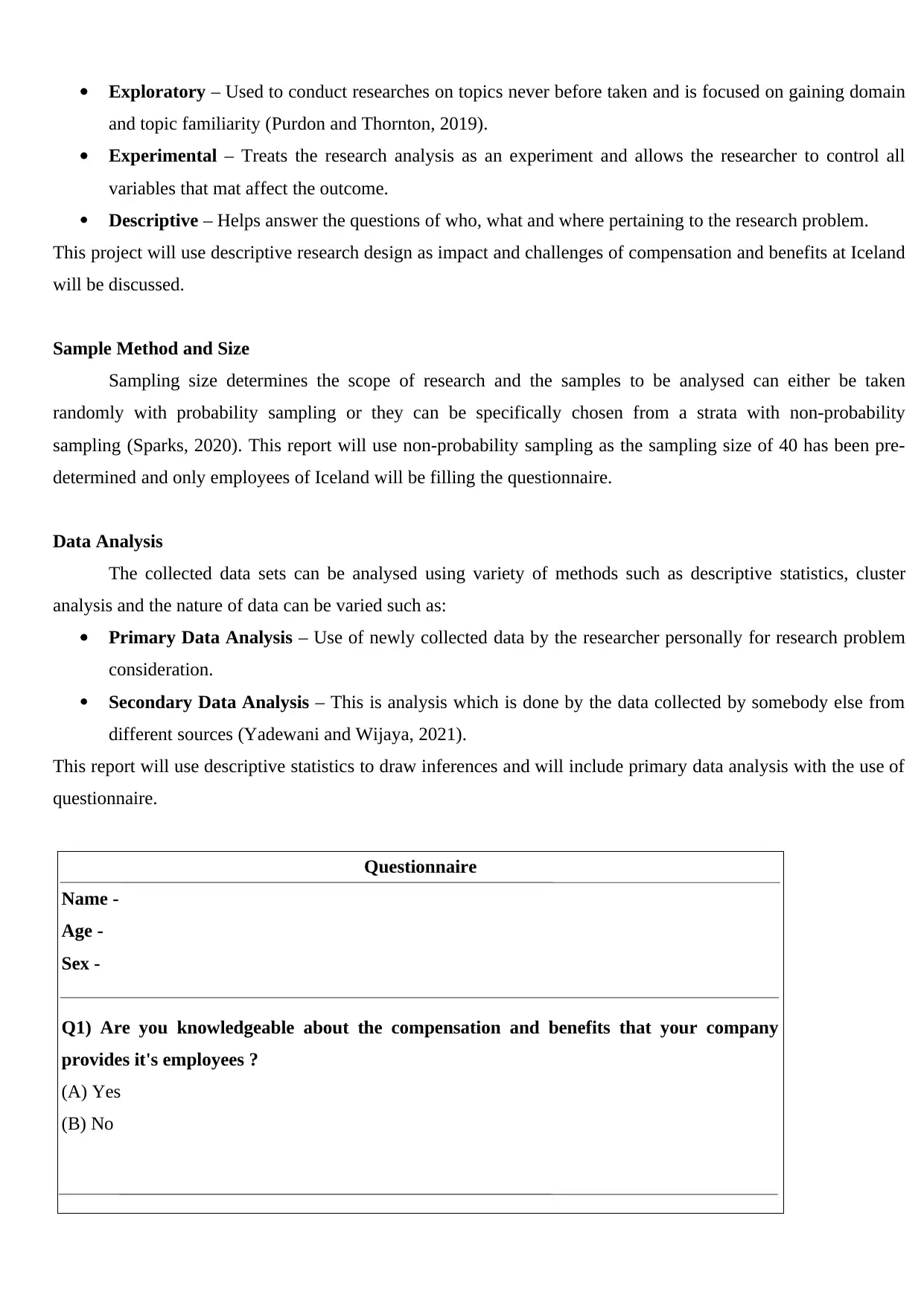
Exploratory – Used to conduct researches on topics never before taken and is focused on gaining domain
and topic familiarity (Purdon and Thornton, 2019).
Experimental – Treats the research analysis as an experiment and allows the researcher to control all
variables that mat affect the outcome.
Descriptive – Helps answer the questions of who, what and where pertaining to the research problem.
This project will use descriptive research design as impact and challenges of compensation and benefits at Iceland
will be discussed.
Sample Method and Size
Sampling size determines the scope of research and the samples to be analysed can either be taken
randomly with probability sampling or they can be specifically chosen from a strata with non-probability
sampling (Sparks, 2020). This report will use non-probability sampling as the sampling size of 40 has been pre-
determined and only employees of Iceland will be filling the questionnaire.
Data Analysis
The collected data sets can be analysed using variety of methods such as descriptive statistics, cluster
analysis and the nature of data can be varied such as:
Primary Data Analysis – Use of newly collected data by the researcher personally for research problem
consideration.
Secondary Data Analysis – This is analysis which is done by the data collected by somebody else from
different sources (Yadewani and Wijaya, 2021).
This report will use descriptive statistics to draw inferences and will include primary data analysis with the use of
questionnaire.
Questionnaire
Name -
Age -
Sex -
Q1) Are you knowledgeable about the compensation and benefits that your company
provides it's employees ?
(A) Yes
(B) No
and topic familiarity (Purdon and Thornton, 2019).
Experimental – Treats the research analysis as an experiment and allows the researcher to control all
variables that mat affect the outcome.
Descriptive – Helps answer the questions of who, what and where pertaining to the research problem.
This project will use descriptive research design as impact and challenges of compensation and benefits at Iceland
will be discussed.
Sample Method and Size
Sampling size determines the scope of research and the samples to be analysed can either be taken
randomly with probability sampling or they can be specifically chosen from a strata with non-probability
sampling (Sparks, 2020). This report will use non-probability sampling as the sampling size of 40 has been pre-
determined and only employees of Iceland will be filling the questionnaire.
Data Analysis
The collected data sets can be analysed using variety of methods such as descriptive statistics, cluster
analysis and the nature of data can be varied such as:
Primary Data Analysis – Use of newly collected data by the researcher personally for research problem
consideration.
Secondary Data Analysis – This is analysis which is done by the data collected by somebody else from
different sources (Yadewani and Wijaya, 2021).
This report will use descriptive statistics to draw inferences and will include primary data analysis with the use of
questionnaire.
Questionnaire
Name -
Age -
Sex -
Q1) Are you knowledgeable about the compensation and benefits that your company
provides it's employees ?
(A) Yes
(B) No
Paraphrase This Document
Need a fresh take? Get an instant paraphrase of this document with our AI Paraphraser
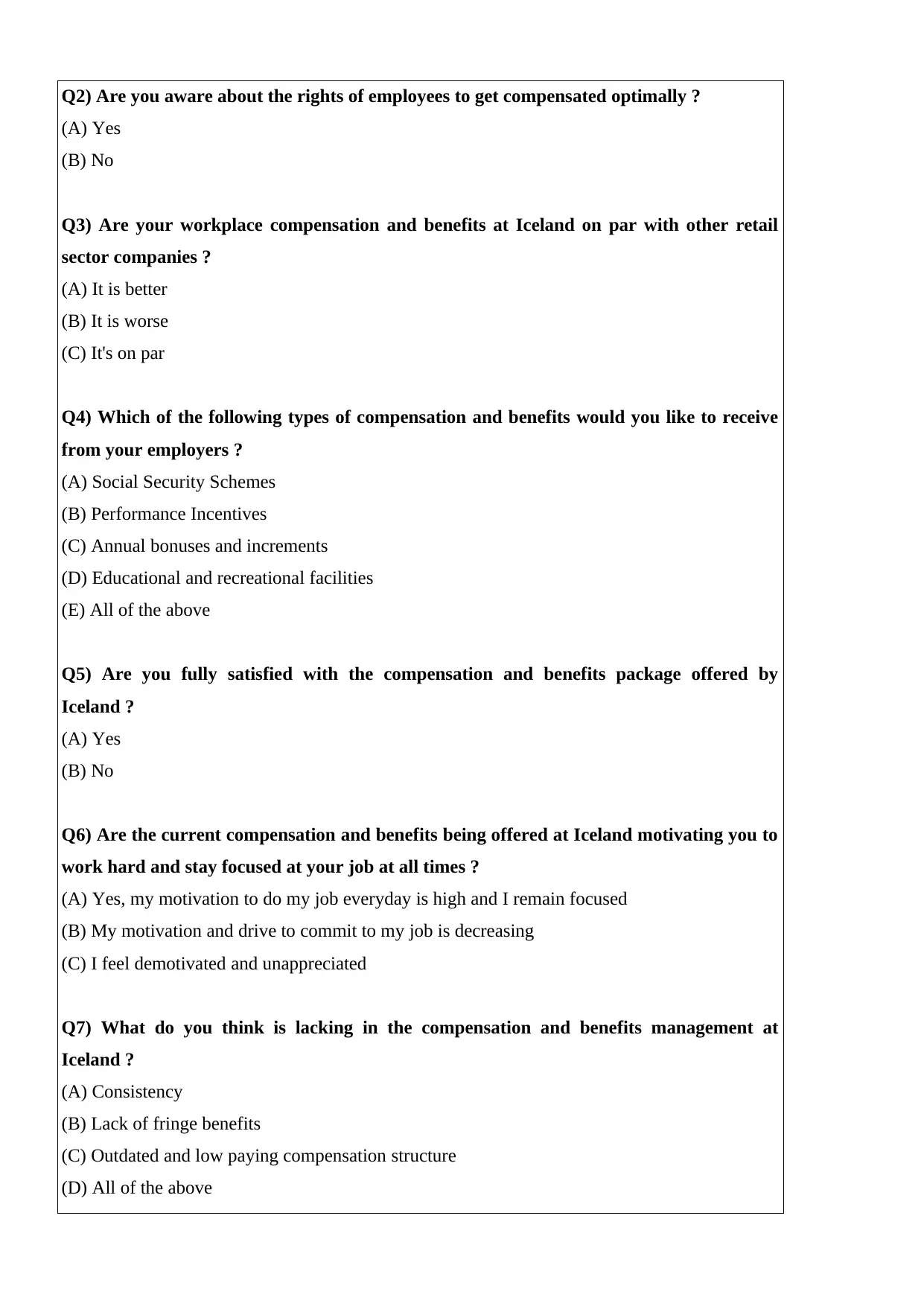
Q2) Are you aware about the rights of employees to get compensated optimally ?
(A) Yes
(B) No
Q3) Are your workplace compensation and benefits at Iceland on par with other retail
sector companies ?
(A) It is better
(B) It is worse
(C) It's on par
Q4) Which of the following types of compensation and benefits would you like to receive
from your employers ?
(A) Social Security Schemes
(B) Performance Incentives
(C) Annual bonuses and increments
(D) Educational and recreational facilities
(E) All of the above
Q5) Are you fully satisfied with the compensation and benefits package offered by
Iceland ?
(A) Yes
(B) No
Q6) Are the current compensation and benefits being offered at Iceland motivating you to
work hard and stay focused at your job at all times ?
(A) Yes, my motivation to do my job everyday is high and I remain focused
(B) My motivation and drive to commit to my job is decreasing
(C) I feel demotivated and unappreciated
Q7) What do you think is lacking in the compensation and benefits management at
Iceland ?
(A) Consistency
(B) Lack of fringe benefits
(C) Outdated and low paying compensation structure
(D) All of the above
(A) Yes
(B) No
Q3) Are your workplace compensation and benefits at Iceland on par with other retail
sector companies ?
(A) It is better
(B) It is worse
(C) It's on par
Q4) Which of the following types of compensation and benefits would you like to receive
from your employers ?
(A) Social Security Schemes
(B) Performance Incentives
(C) Annual bonuses and increments
(D) Educational and recreational facilities
(E) All of the above
Q5) Are you fully satisfied with the compensation and benefits package offered by
Iceland ?
(A) Yes
(B) No
Q6) Are the current compensation and benefits being offered at Iceland motivating you to
work hard and stay focused at your job at all times ?
(A) Yes, my motivation to do my job everyday is high and I remain focused
(B) My motivation and drive to commit to my job is decreasing
(C) I feel demotivated and unappreciated
Q7) What do you think is lacking in the compensation and benefits management at
Iceland ?
(A) Consistency
(B) Lack of fringe benefits
(C) Outdated and low paying compensation structure
(D) All of the above
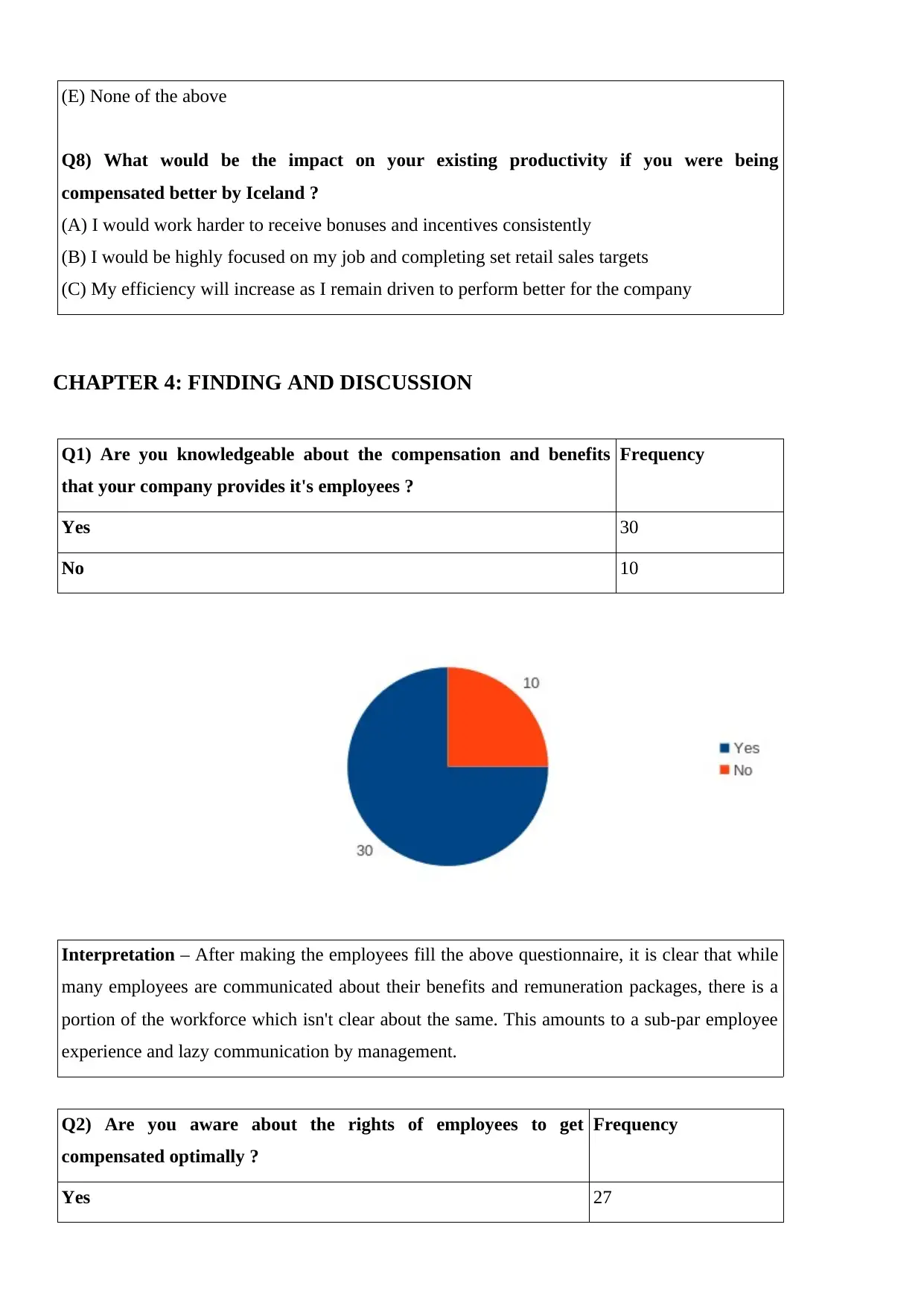
(E) None of the above
Q8) What would be the impact on your existing productivity if you were being
compensated better by Iceland ?
(A) I would work harder to receive bonuses and incentives consistently
(B) I would be highly focused on my job and completing set retail sales targets
(C) My efficiency will increase as I remain driven to perform better for the company
CHAPTER 4: FINDING AND DISCUSSION
Q1) Are you knowledgeable about the compensation and benefits
that your company provides it's employees ?
Frequency
Yes 30
No 10
Interpretation – After making the employees fill the above questionnaire, it is clear that while
many employees are communicated about their benefits and remuneration packages, there is a
portion of the workforce which isn't clear about the same. This amounts to a sub-par employee
experience and lazy communication by management.
Q2) Are you aware about the rights of employees to get
compensated optimally ?
Frequency
Yes 27
Q8) What would be the impact on your existing productivity if you were being
compensated better by Iceland ?
(A) I would work harder to receive bonuses and incentives consistently
(B) I would be highly focused on my job and completing set retail sales targets
(C) My efficiency will increase as I remain driven to perform better for the company
CHAPTER 4: FINDING AND DISCUSSION
Q1) Are you knowledgeable about the compensation and benefits
that your company provides it's employees ?
Frequency
Yes 30
No 10
Interpretation – After making the employees fill the above questionnaire, it is clear that while
many employees are communicated about their benefits and remuneration packages, there is a
portion of the workforce which isn't clear about the same. This amounts to a sub-par employee
experience and lazy communication by management.
Q2) Are you aware about the rights of employees to get
compensated optimally ?
Frequency
Yes 27
⊘ This is a preview!⊘
Do you want full access?
Subscribe today to unlock all pages.

Trusted by 1+ million students worldwide
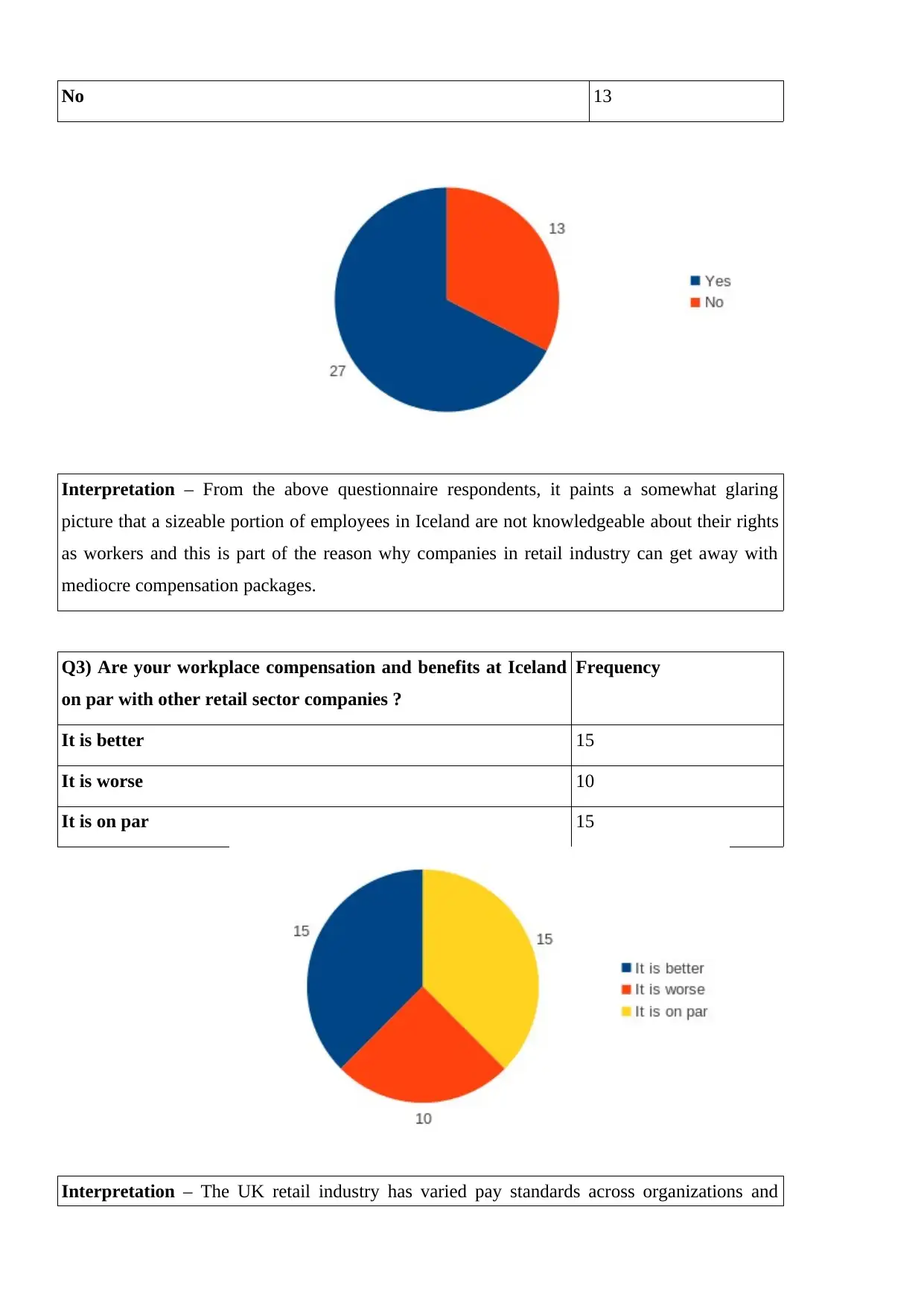
No 13
Interpretation – From the above questionnaire respondents, it paints a somewhat glaring
picture that a sizeable portion of employees in Iceland are not knowledgeable about their rights
as workers and this is part of the reason why companies in retail industry can get away with
mediocre compensation packages.
Q3) Are your workplace compensation and benefits at Iceland
on par with other retail sector companies ?
Frequency
It is better 15
It is worse 10
It is on par 15
Interpretation – The UK retail industry has varied pay standards across organizations and
Interpretation – From the above questionnaire respondents, it paints a somewhat glaring
picture that a sizeable portion of employees in Iceland are not knowledgeable about their rights
as workers and this is part of the reason why companies in retail industry can get away with
mediocre compensation packages.
Q3) Are your workplace compensation and benefits at Iceland
on par with other retail sector companies ?
Frequency
It is better 15
It is worse 10
It is on par 15
Interpretation – The UK retail industry has varied pay standards across organizations and
Paraphrase This Document
Need a fresh take? Get an instant paraphrase of this document with our AI Paraphraser
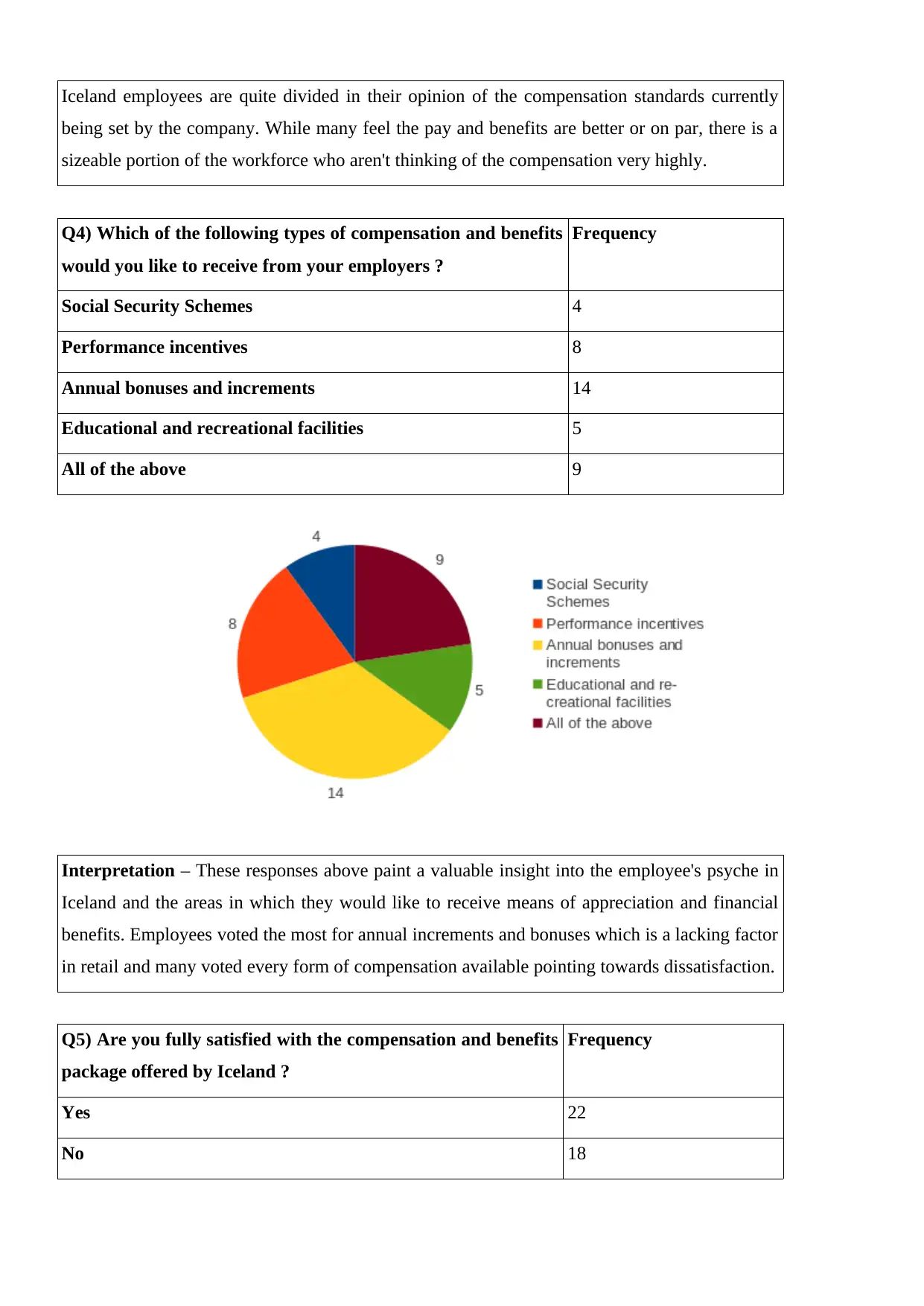
Iceland employees are quite divided in their opinion of the compensation standards currently
being set by the company. While many feel the pay and benefits are better or on par, there is a
sizeable portion of the workforce who aren't thinking of the compensation very highly.
Q4) Which of the following types of compensation and benefits
would you like to receive from your employers ?
Frequency
Social Security Schemes 4
Performance incentives 8
Annual bonuses and increments 14
Educational and recreational facilities 5
All of the above 9
Interpretation – These responses above paint a valuable insight into the employee's psyche in
Iceland and the areas in which they would like to receive means of appreciation and financial
benefits. Employees voted the most for annual increments and bonuses which is a lacking factor
in retail and many voted every form of compensation available pointing towards dissatisfaction.
Q5) Are you fully satisfied with the compensation and benefits
package offered by Iceland ?
Frequency
Yes 22
No 18
being set by the company. While many feel the pay and benefits are better or on par, there is a
sizeable portion of the workforce who aren't thinking of the compensation very highly.
Q4) Which of the following types of compensation and benefits
would you like to receive from your employers ?
Frequency
Social Security Schemes 4
Performance incentives 8
Annual bonuses and increments 14
Educational and recreational facilities 5
All of the above 9
Interpretation – These responses above paint a valuable insight into the employee's psyche in
Iceland and the areas in which they would like to receive means of appreciation and financial
benefits. Employees voted the most for annual increments and bonuses which is a lacking factor
in retail and many voted every form of compensation available pointing towards dissatisfaction.
Q5) Are you fully satisfied with the compensation and benefits
package offered by Iceland ?
Frequency
Yes 22
No 18
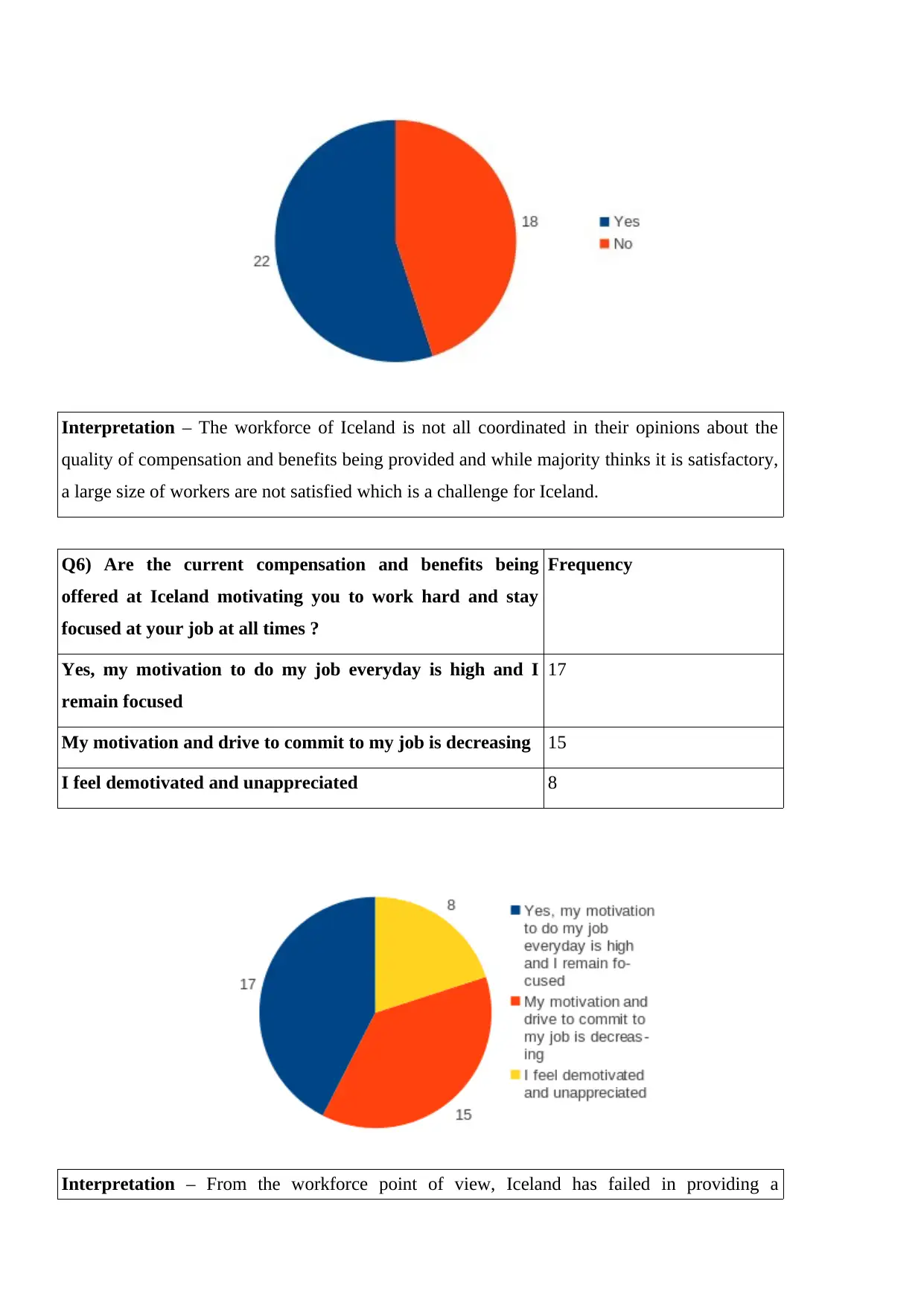
Interpretation – The workforce of Iceland is not all coordinated in their opinions about the
quality of compensation and benefits being provided and while majority thinks it is satisfactory,
a large size of workers are not satisfied which is a challenge for Iceland.
Q6) Are the current compensation and benefits being
offered at Iceland motivating you to work hard and stay
focused at your job at all times ?
Frequency
Yes, my motivation to do my job everyday is high and I
remain focused
17
My motivation and drive to commit to my job is decreasing 15
I feel demotivated and unappreciated 8
Interpretation – From the workforce point of view, Iceland has failed in providing a
quality of compensation and benefits being provided and while majority thinks it is satisfactory,
a large size of workers are not satisfied which is a challenge for Iceland.
Q6) Are the current compensation and benefits being
offered at Iceland motivating you to work hard and stay
focused at your job at all times ?
Frequency
Yes, my motivation to do my job everyday is high and I
remain focused
17
My motivation and drive to commit to my job is decreasing 15
I feel demotivated and unappreciated 8
Interpretation – From the workforce point of view, Iceland has failed in providing a
⊘ This is a preview!⊘
Do you want full access?
Subscribe today to unlock all pages.

Trusted by 1+ million students worldwide
1 out of 22
Related Documents
Your All-in-One AI-Powered Toolkit for Academic Success.
+13062052269
info@desklib.com
Available 24*7 on WhatsApp / Email
![[object Object]](/_next/static/media/star-bottom.7253800d.svg)
Unlock your academic potential
Copyright © 2020–2026 A2Z Services. All Rights Reserved. Developed and managed by ZUCOL.





